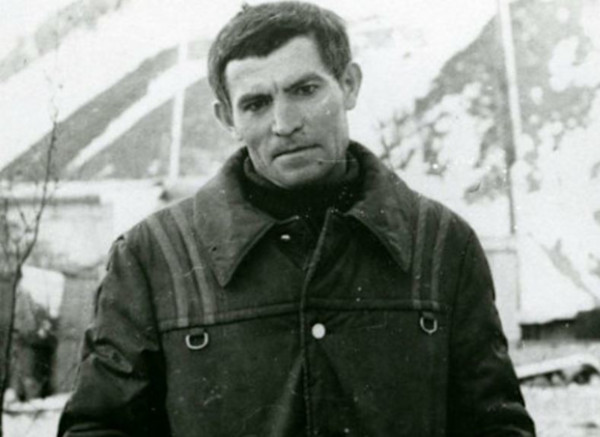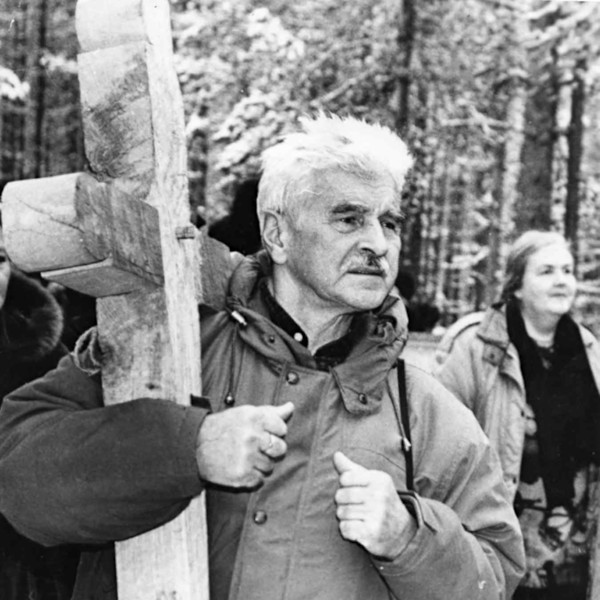A speech by Vasyl Ovsienko at Yevhen SVERSTIUK’S literary evening “At the Festival of Hopes” on December 16, 2008, at the Philharmonic Hall; on December 13, 2018, at the Actor’s House; and on January 12, 2019, at the Kyiv City Council at 5:00 PM.
In 2004, I was preparing a book by Oksana Meshko for publication to commemorate the 100th anniversary of her birth, and I was collecting her letters from various people. I also reached out to Yevhen Oleksandrovych Sverstiuk. He provided not only letters from Oksana Meshko, but also two letters from Vasyl Stus, written in exile—dated March 8 and April 30, 1979.
At the time, Stus was in exile in the Magadan Oblast (in Kolyma), while Sverstiuk was, by Siberian standards, not far away—in Buryatia.
I asked the addressee why he had not published those letters for over 25 years.
It turned out that he valued these letters so much that he was afraid the KGB would confiscate them during a search. He hid them in an envelope with a most innocent-looking letter from a village, managed to bring them to Kyiv, and they were kept by Vira Tkachenko. “But when you hide something,” he said, “it’s as if you deliberately forget where you put it.”
In his letters, Vasyl offers help: perhaps warm clothes, books, or a record player are needed.
V. Stus: “I think there will be no formalities between us here—it’s awkward, a waste of time, etc. I am You. And in You, I am better than I am in Myself. So let me better myself! You know, you appeared in my dreams on the great New Year’s night! For me, You are a synonym for Conscience, the highest, brightest Star of my celestial brotherhood. You, Paruyr /Hayrikyan/, Razmik /Markosyan/, Zoryan Popadiuk, Serhiy Soldatov, and two or three other men. But You—even in this constellation—are radiant.”

Vasyl Stus
Y. Sverstiuk: “He must have been arranging the guests of his ‘round table’ in his wild solitude. I know that Vasyl Stus never writes ‘just because,’ and I suspect he nurtured all his visions during the long Kolyma nights.”
And Sverstiuk replied to Stus—20 years later, before Christmas of 1999:
“Basileus,
You were the first to send greetings—somehow, you always manage to be the first…
While they argued over whether manuscripts burn, You wrote on earth that burned under your feet, and God protected you. Even your two poems for me reached me on my gray-haired day of grace. So, ‘it’s the unwritten letters that don’t arrive,’ that’s for sure. And people whose lights have gone out do not illuminate our Ukraine for the world—that is also for sure. Yours… take a long time, but they do arrive…
The day does not shine for all, not all are radiant, and no past illuminates a person for the future. But a word, lit by love and pain, will not fade, for it is kin to the Word—to the Light. Thank God there was someone to gather Your sparks in the twilight at the end of the century.
Thank you, Basileus! I greet you, like a shooting star, on the other shore.”

Yevhen Sverstiuk with the cross “To the Murdered Sons of Ukraine” in the Sandarmokh tract (photo: Volodymyr Shcherbyna, October 27, 1997)
The first publication of these poems in the newspaper “Nasha Vira” in January 1999 was preceded by a word from Dmytro Stus:
“When almost the entire archive of the poet had been processed, Oksana Dvorko came across several unknown drafts of poems, united by a single theme—respect for Yevhen Sverstiuk.”
How these poems echo the aforementioned letters!
Here they are.
Vasyl STUS
From behind bars, from behind losses, from behind muteness
a copper-silver bell.
It was you, Yevhen, who resounded,
like ding, like dong—and ding.
The trees bent toward me,
clouds came roaring,
and dust-covered words,
and the fated command: be silent.
And suddenly it became quiet for us
and it became mute for us,
and we gave ourselves over to tears
and to the years we had lost.
Vasyl STUS
A shirt flutters—made of white pain-fire,
a road streams—from a white, white pain.
In a shirt white as summer, white as heat,
along the white road, a nobleman strode,
(in what time, in what age, in what year?),
how cheerful he was, as if heading to a wedding.
I watched him, for I myself belonged to him,
for I too glanced with a dancing, joyous eye
across the hamlets—above the domes, and if cities—then above the towers,
anxious and resounding, I drank from a spring-like voice.
Only Yevhen, only Yevhen alone speaks this way—
like a spring stream or water flowing up a mountain path.
Whom did he leave? And for whom does he wait so long?
What beautiful, handsome misfortune has befallen him?
Prison friends, the devil won’t grind us down with three flails,
though the threshing floor is already stained with blood.
Who is being carried now, who is trembling with rage,
whose cautious tongue has run far away?
In a shirt, white as summer, white as summer,
along the white road, a nobleman strode.
And I am on that shore, I am on that far shore.
And did the master vanish? But did the master vanish? Or has he vanished?